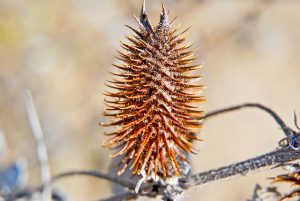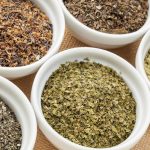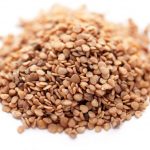
Xanthium – sources, health benefits, nutrients, uses and constituents at NaturalPedia.com
Saturday, September 02, 2017 by Rhonda Johansson
http://www.naturalnewsherbs.com/2017-09-02-xanthium-sources-health-benefits-nutrients-uses-and-constituents-at-naturalpedia-com.html

Most people consider xanthium to be an annoying plant. Otherwise known as cocklebur, the common bush with small, thorny burs often gets stuck to our clothing as well as animal fur. It is exceedingly difficult to take out as the hooked spines display a velcro-like propensity. Still, the plant is often used in traditional Chinese medicine where it is called cang er zi.
The plant is endemic to various parts of Europe, North America, and western Asia. Ancient healers believed the plant could dispel wind and damp due to its bitter and warm properties. This made it the go-to herb for “wet” conditions such as sinus congestion, chronic nasal obstruction, and respiratory allergies. Medical studies suggest that the herb’s applications may even extend to relieve headaches and cluster migraines.
Xanthium is often taken in conjunction with other warm plants such as angelica and magnolia.

List of known nutrients
- Alkaloid
- Alpha-hydroxytomentosin
- Beta-sitosterol
- Caffeic Acid
- Caffeoylquinic Acids
- Cephalin
- Ceryl Alcohol
- Chlorobutanol
- Choline
- Cinnamic Acid
- Dihydrotomentosin
- Endoperoxide
- Epixanthatin
- Ferulic Acid
- Folium Seu
- Fructus Xanthii
- Gamma-Sitosterol
- Heptacosanol
- Hydroxypyrrolidin
- Hydroxytomentosin
- Isohexacosane
- Isoxanthanol
- Lecitihin
- Linoleic Acid
- Oleic Acid
- Palmitic Acid
- Poriferosterol
- Stumasterol
- Tomentosin
- Vomifoliol
- Xanthanol
- Xanthiazone
- Xanthienopyran
- Xanthinin
- Xanthipungolide
- Xanthiside
- Xanthium
- Xanthium Japonicum
- Xanthium Sibiricum
- Xanthostrumarin
- Xanthumin
Medical uses for xanthium
Xanthium is used to relieve sinus congestion and other respiratory conditions. Traditional healers typically prescribe the herb in conjunction with either extracts of the magnolia flower or angelica root. Xanthium is rarely given as is, although this does not suggest that it is ineffective by itself. The added herbs are included to augment xanthium’s medicinal effects and hasten the healing process.
Apart from relieving respiratory conditions, xanthium is a well-documented analgesic. This means it can be used to alleviate aches and pains caused by a fever or other similar conditions. Xanthium may likewise be used to treat headaches caused by sinusitis. When applied topically, the herb can relieve mild cases of itching, swelling, and eczema.
Xanthium, however, cannot be taken on a regular basis. Overconsumption of the herb can cause severe hepatitis and lead to liver failure. Xanthium can cause death when taken in excess. Patients should immediately discontinue using the herb is they begin to vomit, feel nauseous, have diarrhea, or start to experience abdominal cramps. Xanthium should also not be taken by people with anemia.
Body systems supported by xanthium
Botanical studies have shown xanthium to be an effective aid for respiratory health. Its primary function is to relieve any form of congestion in the system by forcibly expelling phlegm.
The plant is also reported to be effective in supporting skin function and addressing various inflammatory conditions in the muscular system.
Ways to use xanthium
You can find xanthium as a tablet supplement in local health stores. Some specialty groceries sell the plant as ground powder. The recommended dosage is around three to nine grams, although ingestion of xanthium should be done under the careful supervision of an herbal doctor. Remember that excessive use of xanthium can induce abdominal pain, vomiting, and diarrhea.
Where to learn more
Summary
Xanthium helps with nasal congestion and other respiratory conditions.
Taking too much of it though can cause gastrointestinal issues.
Sources include:
Tagged Under: Tags: Xanthium





